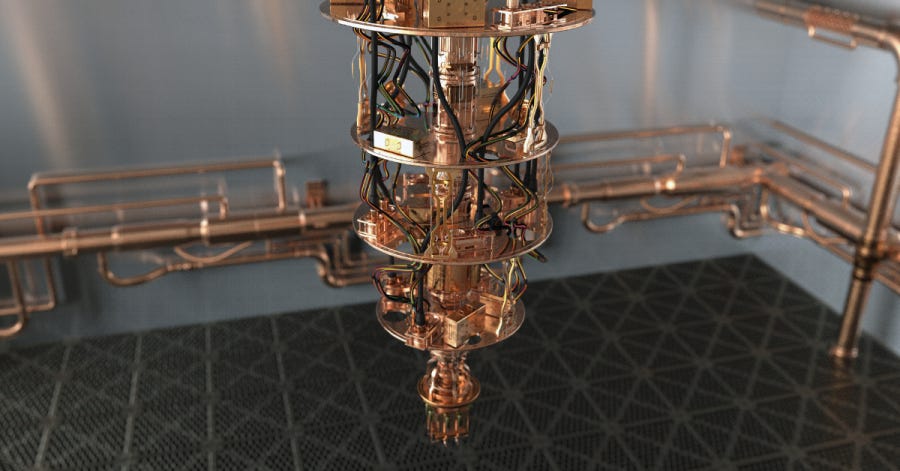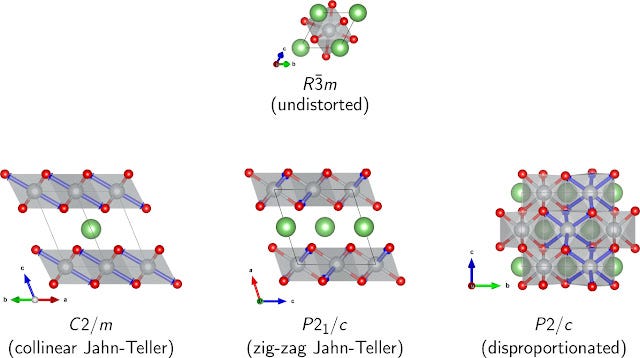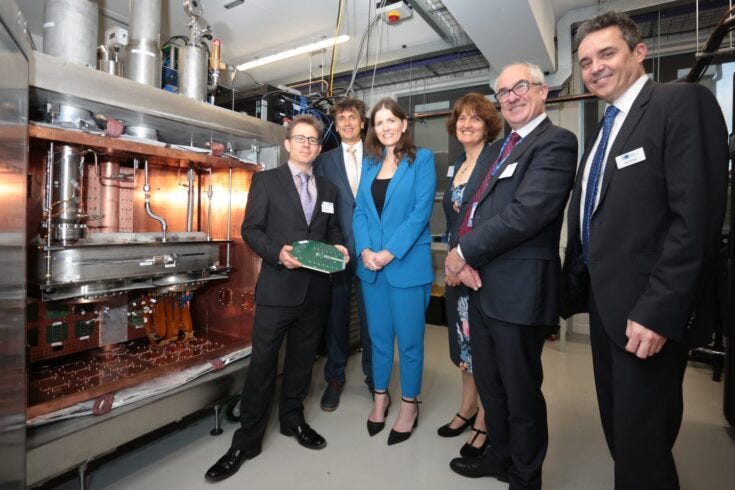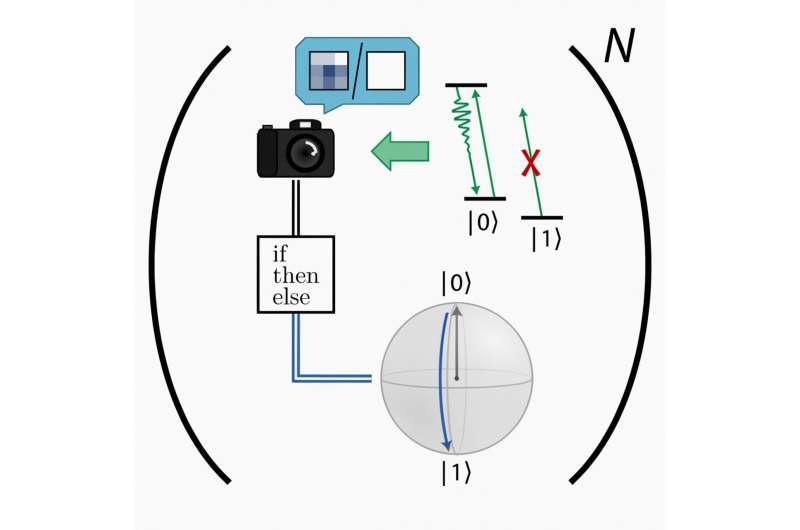The Week in Quantum Computing - October 23st
Issue #157
The Week in Quantum Computing. Brought to you by Sergio Gago (@piratecto).
Quick Recap
Taiwan's Hon Hai Precision Industry Co. unveiled its trapped-ion quantum computing lab, which aims to bolster development in AI and vehicle technologies, marking a significant stride forward in Taiwan's quantum tech advances. Central and Eastern Europe is positioning itself as a hub for quantum technology, with over 25 startups and R&D projects focused on this field, facilitated by academia, European projects, and growing startup culture. Despite this progress, challenges such as securing necessary infrastructure and funding, and global competition, do persist. In France, a consortium led by quantum computing company PASQAL aims to develop a scalable quantum computer platform using photons, funded by the European Innovation Council. Google Quantum AI is harnessing quantum simulation technology potential across multiple sectors in collaboration with industry and academic partners. They are developing quantum algorithms for analyzing the cytochrome P450 enzyme family which is critical for drug metabolism; exploring cobalt alternatives for lithium-ion batteries; and researching materials properties for inertial confinement fusion experiments. Europol highlights "The Second Quantum Revolution", emphasizing both the potential of quantum technology for law enforcement, and the risks of its misuse. Highlighting the educational sector, Rensselaer Polytechnic Institute becomes the first university globally to own an IBM Quantum System One, depicting education's increasing role in advancing quantum tech. Corporate partnerships also feature with Accenture's strategic investment in Aliro Quantum, signaling the vital role of quantum networking in securing future communications. Finally, the Shor's algorithm, designed for quantum computers, has been given a speed enhancement by New York University computer scientist Oded Regev, a reminder of the constant evolution of quantum technology. In conclusion, this week underlines the global progress in quantum computing—through innovative research, burgeoning startups, corporate investments, and technological advancements. Challenges remain, notably in infrastructure and funding, but these developments provide a balanced outlook—signifying incredible potential while also stressing the need for caution to pre-empt misuse. As we move into another exciting week, it will be intriguing to see how these advancements shape the future of quantum computing.
The Week in Quantum Computing
Hon Hai launches quantum computing lab
Hon Hai Precision Industry Co.’s research institute has launched a trapped-ion quantum computing lab as part of its "3 plus 3" transformation initiative, focused on electric vehicles, robots, and digital healthcare development using artificial intelligence, semiconductors, and communications technologies. The lab, the first of its kind in Taiwan, will focus on developing efficient computing for new generation artificial intelligence and automotive-related technologies. Lin Guin-dar, Trapped Ion Quantum Computing Laboratory director notes that while quantum computing is a "holy grail" for next-generation technology development, achieving this won't happen overnight. The lab has been in planning for nearly two years and aims to explore key technology research including quantum control, scalable computer architectures, and chips integrating micro-ion traps and optoelectronic circuits. The key takeaway is that Hon Hai's latest venture represents a significant step in Taiwan's quantum computing advances and reinforces the company's commitment to emerging technology sectors.
https://www.taipeitimes.com/News/biz/archives/2023/10/16/2003807735
CEE Is Getting Ready for the Future with Quantum Technology: 25+ Startups and R&D Projects
Central and Eastern Europe (CEE) is increasingly embracing quantum technology with over 25 startups and R&D projects in the field. Quantum computing uses quantum bits (qubits) enabling the processing of vast amounts of data parallelly. Tensor Ventures' Katerina Syslova compared quantum technology's impact to that of transistors on electronic devices, providing the capacity to tackle formidable challenges and revolutionize sectors like drug development, material science, and more. VC investment in quantum tech startups in Europe concentrates on four main areas with quantum computers and processors attracting $362M. Regional quantum advancements are facilitated by academic institutions, European projects, and a burgeoning startup scene, particularly in countries like Poland and Hungary. Still, securing the necessary infrastructure, the funding and the global competition with quantum powerhouses remain a challenge. The key takeaway is that CEE must foster academic and research collaborations and strengthen its quantum infrastructure.
https://therecursive.com/cee-quantum-technology-startups-and-r-d-projects/
PASQAL Announces Partnership to Develop the Foundations of a Photonic Quantum Processor Powered by Neutral Atom Technology
PASQAL, a French leader in neutral atoms quantum computing, has partnered with several renowned institutions to develop the foundations for a photonic quantum processor. The consortium includes Sorbonne University (France), Pixel Photonics GmbH (Germany), The Institute of Photonic Sciences (Spain), and Institut d'Optique Théorique et Appliquée (France). The initiative is funded by the Pathfinder-2023 challenge grant of the European Innovation Council. The processor would use light as the carrier of quantum information and aims to create a scalable quantum computer platform. PASQAL's CTO Loïc Henriet expressed optimism for the innovation, as did Wladick Hartmann, Pixel Photonics' CTO. Sorbonne University's Nicolas Treps, who is coordinating the project, underscored its scientific significance. The key takeaway is that collaborative efforts are leveraging light's intrinsic properties to overcome challenges in quantum computing.
Developing industrial use cases for physical simulation on future error-corrected quantum computers
Google Quantum AI, in collaboration with industry and academic partners is exploring quantum simulation technology's potential applications, focusing on three key areas. Firstly, they partnered with pharmaceutical company Boehringer Ingelheim, startup QSimulate, and Columbia University in developing quantum algorithms for analyzing the cytochrome P450 enzyme family, crucial for drug metabolism. Their work showed that quantum computers can provide better accuracy and resource efficiency in complex reactions than classical computers. Secondly, Google Quantum AI teamed up with chemical company BASF, and Macquarie University in Australia, to study alternatives to cobalt for lithium-ion batteries using quantum simulation. The third project is on modeling the properties of materials in inertial confinement fusion experiments which could potentially revolutionize specific technologies. The key takeaway is that while error-corrected quantum computers are still years away, these efforts will ensure readiness with efficient quantum algorithms when they come into existence.
http://blog.research.google/2023/10/developing-industrial-use-cases-for.html
The Second Quantum Revolution : the impact of quantum computing and quantum technologies on law enforcement : Europol
The document discusses "The Second Quantum Revolution" and its implications for law enforcement as presented by Europol. Quantum computing and associated technologies present a paradigm shift in crime fighting strategies with their ability to handle complex calculations and encryption. However, the same power also presents risks, enabling criminals with greater capabilities. With the advent of quantum technologies, law enforcement agencies need to gear up for new challenges that this revolution will bring.
Rensselaer Polytechnic Institute First to Have Quantum Computer
Rensselaer Polytechnic Institute (RPI) became the first university in the world to own a quantum computer system, the IBM Quantum System One. IBM's partnership with RPI aims to make the university a leader in the Quantum Era. The system will be housed in the Voorhees Computing Center and be readily available for student use. The quantum computer, which operates using quantum mechanics, can tackle complex problems that outstrip supercomputers. It is expected to be fully operational by January. RPI's quantum computer system represents an investment exceeding $150 million, partly funded by philanthropist Curtis Priem '82. Dario Gil, IBM's research director, expressed his expectation that the next quantum computing breakthroughs would come from the RPI community.
Accenture Invests in Aliro Quantum to Establish Secure Quantum Networks
Accenture has announced a strategic investment in Aliro Quantum, a company specializing in multipurpose, secure quantum networks. The investment, conducted via Accenture Ventures, will support the establishment of robust quantum networks for secure data and communication for Accenture and Aliro's clients. Aliro’s solutions enable businesses to control and automate their quantum networks, with applicability ranging from quantum secure communications to a quantum internet. Aliro applies entanglement-based quantum cryptography to ensure secured knowledge sharing and minimize interference risk. Accenture plans to integrate Aliro’s software capabilities into its cybersecurity offerings. Directors from both companies - Tom Lounibos from Accenture Ventures and Dr. Prineha Narang from Aliro - expressed optimism about quantum networking's transformative potential.
Thirty Years Later, a Speed Boost for Quantum Factoring
The long-established Shor's algorithm, designed to allow quantum computers to quickly factor large numbers, has been given a speed enhancement in a new version announced by Oded Regev, a computer scientist from New York University. Shor's method, which has huge potential implications for internet security protocols, is being refined in anticipation of quantum technology evolution. Regev's variant is the first to ameliorate the connection between the size of the number being factored and the quantity of quantum operations needed to process it. Peter Shor, the algorithm’s originator, expressed surprise at the advance. The need to counteract this quantum computation threat has become critical as today's state-of-the-art quantum machines now boast several hundred qubits.
https://www.quantamagazine.org/thirty-years-later-a-speed-boost-for-quantum-factoring-20231017/
DigiCert Global Study: Preparing for a Safe Post-Quantum Computing Future
According to a global study by DigiCert Inc., IT leaders are emphasizing a crucial need to invest immediately in quantum-safe security measures to prepare for post-quantum computing future. The call for this preemptive step comes in response to the prospective security threats that powerful quantum computers pose to classical encryption systems. Impending quantum computers will be able to crack standard encryption, exposing currently protected data. As companies transition towards a quantum computing realm, protection against potential threats needs parallel evolution. The key takeaway from this study calls for immediate investment in quantum-safe security infrastructure to preemptively tackle security threats to data encryption in a future quantum computing environment.
PsiQuantum opens R&D facility at Daresbury Laboratory
PsiQuantum, a Silicon Valley start-up, has inaugurated PsiDaresbury, a quantum computing centre at the Daresbury Laboratory, marking its first R&D facility outside of the US. The UK government has supported this initiative with £9 million. Focused on building the first large-scale quantum computer, the facility will leverage the laboratory's advanced cryogenic systems and expertise. PsiQuantum aims to build a fault-tolerant quantum computer which presents a significant stride in tackling commercial problems. Michelle Donelan, Secretary of Science, Innovation and Technology, called this move a “resounding vote of confidence” in the UK's quantum capabilities, backed by the government's £2.5 billion commitment over the next decade. In addition to this, PsiQuantum announced a collaboration with STFC's Hartree Centre to foster practical industrial applications for large-scale quantum computing.
https://www.ukri.org/news/psiquantum-opens-rd-facility-at-daresbury-laboratory/
MIT receives major National Science Foundation grant for quantum science
The U.S. National Science Foundation (NSF) has renewed the financial support for the MIT-Harvard Center for Ultracold Atoms (CUA) through the NSF Physics Frontiers Centers program. The grant will fund experiments warranting intense exploration into phenomena at the forefront of physics, including quantum-entangled system, atom-like impurities in semiconductors, and "strong coupling." The initiative is set to catalyze advancements in measurement, sensing, and networking. Professor Wolfgang Ketterle underscores the significance of sustained funding. Deepto Chakrabarty, Head of the Physics Department, commends the grant renewal, noting that it boosts MIT's strength in quantum science. With a total of $76 million supporting four U.S. research centers, this program seeks to advance scientific exploration and fortify the U.S. scientific workforce.
https://news.mit.edu/2023/mit-receives-major-nsf-grant-quantum-science-1018
The Quest to Quantify Quantumness
For over 40 years, physicists and mathematicians have been exploring the powers of quantum computing that vastly exceed those of classical computing. Key figures in the field include Richard Feynman, who speculated on quantum principles in 1981 and mathematician Peter Shor, who demonstrated how qubits could impact encryption. Nowadays, experts such as physicist Crystal Noel at Duke University and quantum researcher Bill Fefferman at the University of Chicago, work to quantify 'quantumness'. Instead of one metric, researchers have found three distinct facets of quantifying quantum and classical realms. Research by Kamil Korzekwa of Jagiellonian University in Poland amongst others, is refining knowledge of this complex topology combining physics and computer science.
https://www.quantamagazine.org/the-quest-to-quantify-quantumness-20231019/
Azure Quantum Integrated Hybrid unlocks algorithmic primitives
Microsoft Azure Quantum is enabling hybrid quantum computing through Azure Quantum Integrated Hybrid, a solution that allows classical and quantum code to mix. This development proffers a new generation of hybrid algorithms which benefits from complex side-computations occurring whilst the quantum state of the processor remains coherent. Microsoft partnered with Quantinuum, where Senior Advanced Physicist, Natalie Brown, played a pivotal role, stating that this amalgamation "opens the door to a new generation of hybrid algorithms". Two such algorithms demonstrated are Magic State Distillation (MSD) and Repeat-Until-Success (RUS) protocols. The successful algorithmic implementations were tested on Quantinuum's H1-Series quantum computer, leveraging Quantum Intermediate Representation (QIR) based on LLVM, and written entirely in Q#. The critical takeaway is that Azure Quantum is making tangible strides towards quantum supercomputers with hybrid quantum algorithms.
Measurement-induced entanglement and teleportation on a noisy quantum processor
The team at Google Quantum AI and Collaborators successfully leveraged measurement-induced entanglement and teleportation on up to 70 superconducting qubits of a noisy quantum processor. The study applied the duality mapping to overcome limitations of mid-circuit measurement and facilitate the emergence of underlying quantum information phases. Measurements in quantum theory can create teleportation and impact the 'arrow of time'. This process presents challenges for noisy intermediate-scale quantum (NISQ) processors due to hardware limitations and quantum measurement's stochastic nature. The study's approach revealed distinct sensitivity levels to noise within the phases, offering valuable diagnostic utility by turning an inherent hardware limitation into a tool. These findings illustrate how to realize measurement-induced physics at the limits of the current NISQ processors.
https://www.nature.com/articles/s41586-023-06505-7
Quantum Computing Projects for Beginners to Try in 2023
The article highlights beginner-friendly projects that can help people delve into Quantum Computing in 2023. Five exciting quantum projects are discussed; 'Quantum Hello World' introducing the creation of primary quantum circuits, 'Quantum Coin Flip' that demonstrates the concept of superposition, 'Quantum Cryptography with Quantum Key Distribution (QKD)', 'Grover’s Algorithm for Database Search', and 'Quantum Machine Learning'. For these projects, Microsoft's Quantum Development Kit or IBM's Qiskit can be used, which also offers a quantum simulator for testing circuits. The complexity, unfamiliarity and infancy of quantum computing pose challenges, including limitations in quantum hardware's qubits and noise. However, the rewarding aspects are immense, including mental stimulation, career opportunities, and the chance to contribute to path-breaking discoveries.
https://www.analyticsinsight.net/quantum-computing-projects-for-beginners-to-try-in-2023/
Nondestructive measurement realized in ytterbium qubits, aiding scalable neutral atom quantum computing
Physicists at the University of Illinois Urbana-Champaign have developed a nondestructive method for measuring ytterbium-171 qubits, boosting the potential for scalable neutral atom quantum computing, according to a study published in PRX Quantum. The metal ytterbium-171 has two accessible quantum levels when cool, simplifying its use as a qubit without susceptibility to displacement. Team lead Jacob Covey acknowledges the complications with the atom’s overall structure, which has led groups working with ytterbium to redevelop many standard atomic physics techniques. The researchers achieved a 99% successful nondestructive measurement rate, and implemented real-time adaptive control in their system, paving the way for more efficient large-scale quantum behaviour. Lead author William Huie anticipates their ytterbium platform will be instrumental in exploring these developments. The key take-away is the potential for ytterbium-171 to advance scalable neutral atom quantum computing.
https://phys.org/news/2023-10-nondestructive-ytterbium-qubits-aiding-scalable.html
Academic paper: ORCA research illuminates path to fault tolerance
ORCA Computing revealed a new architectural approach to photonic quantum computers that significantly improves performance amid challenges such as photon loss. Their research demonstrated that fault-tolerant quantum computers can be developed with simpler resource states through a distinctive method for loss-resistant quantum information processing. This breakthrough points toward a commercially viable way of building universal quantum computers. The innovation lies in ORCA's novel technique of measuring resource states, shifting complexity to the traditionally 'easy' component of the computer, while allowing the use of simpler resource states without compromising performance. This boosts photon-loss tolerance and scalability in photonic quantum computers. In summary, ORCA’s cutting-edge linear-optical measurement protocol revolutionizes the way we approach quantum computing, bringing us closer to feasible quantum technologies.
Why Gartner Excluded Quantum Computing from its 2024 Top Tech Trends
Gartner, the renowned global research and advisory firm, excluded quantum computing from its 2024 Top 10 Strategic Technology Trends report. Gartner VP analyst, Bart Willemsen, clarified that the exclusion doesn't undermine quantum computing's potential impact, but rather reflects its lack of short-term actionability for the C-suite. Despite quantum hardware availability, the programming capabilities for mass adoption at scale aren't yet mature. Willemsen assured that a substantial impact from quantum computing is expected by the end of this decade. In the meantime, he urged companies to focus on adopting privacy-enhancing technologies, like homomorphic encryption, which could withstand initial quantum computing impacts. These measures need to be implemented years in advance of quantum computing's global permeation.
Understanding Quantum Technologies 2023
"Understanding Quantum Technologies 2023", the latest edition of a comprehensive guide to quantum technologies by an undisclosed author, has been released. It's the 6th edition of this free-to-download book, which spans 1364 pages across 3 e-reader and future paperback volumes. The book covers all aspects of quantum technology including history, science, hardware/software, telecommunications, cryptography, sensing, and the quantum matter. The book outlines various aspects of quantum technology in different sections including quantum physics (140 pages), quantum computing hardware (344 pages), quantum computing programming(270 pages), and quantum communication (94 pages). The book also includes directories of quantum industry vendors, describing up to 665 organizations. Updates to the document will be made until January next year.
https://www.oezratty.net/wordpress/2023/understanding-quantum-technologies-2023/






